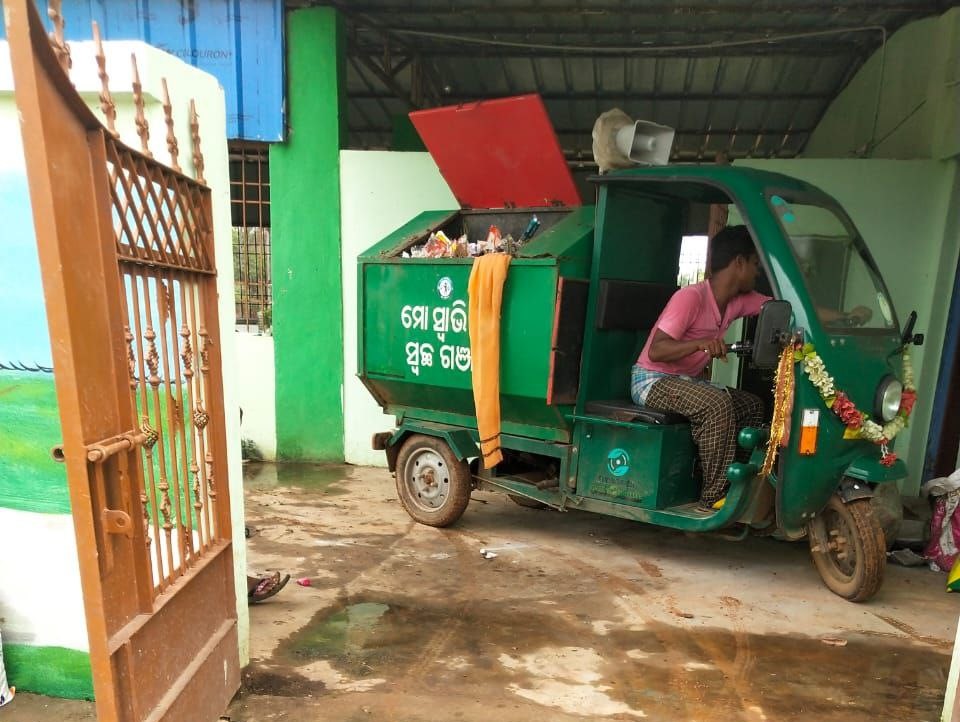A panchayat leads the way with environmental stewardship through waste segregation
StoryBy Chandrika Patnaik
14 June 2023
Rural communities through collective effort embrace sustainable solutions to decrease carbon footprint and contribute to a healthier planet.

Waste collection vehicle moving door to door to collect household garbage.
Photograph by Manikamala Swain
Chamakhandi Panchayat in the Chhatarpur block of the Ganjam district in Odisha is reaping the gains of a clean environment by embracing sustainable solutions across its eight villages.
In 2016, P Laxmeya Reddy, 55, a resident of Jagyashala village and President of the Village Development Committee (VDC), inspired 128 households to build a sustainable waste management system jointly.
Residents contributed money, bought five dustbins and three carts for different locations across the village, and emptied the garbage weekly to vacant land 1.5 kilometres close to the village. The VDC set a fine of ₹300 for those who littered the environment. This measure encouraged the families to be responsible and keep their surroundings clean.
Besides Jagyashala village, Chamakhandi Panchayat in the Chhatarpur block of the Ganjam district consists of Banabulapalli, B.Totapalli, Chamakhandi Chhaka, Sitanagar, Sitarampur, Chamakhandi, and Sindurapalli.
In 2019, the Chamakhandi Panchayat received approval for setting up a Micro Composting Centre in Jagyashala village to cater to all the eight villages under it.
P. Nirupama Reddy, 45, a resident and former VDC member of Jagyashala, became a Ward member in February 2021. On learning about the proposal for a compost centre, she took it forward for a discussion with the other leaders of all eight villages within the Panchayat to address the increasing garbage problem and the deteriorating appearance of the surroundings.
With everyone’s consent, she led discussions to quicken the pace of setting up the compost centre during Panchayat meetings. She says, “I aimed to set up the Micro Composting Centre as soon as possible. Our surroundings were an eyesore, with garbage lying everywhere. The garbage had been causing an unhealthy environment for the village residents, and it was important to get together and find a solution.”
Finally, the inauguration of the Micro Composting Centre took place in Jagyashala in 2021. The centre sorts waste from all eight villages under the Panchayat. There are 1,257 households in Chamakhandi Panchayat. Every household has two dustbins, and auto rickshaws collect household waste from individual homes daily. The Panchayat decided to implement a monthly fee of ₹10 per household to cover the expenses for collecting day-to-day waste and sorting it at the centre.
The responsibility of collecting garbage from individual homes, maintaining log books and paying the wages of the autorickshaw drivers and the women at the sorting centre was entrusted with a Self-Help Group (SHG).
After six months, the SHG needed help managing independently due to high overhead costs. The Panchayat then assigned the SHG Federation to take up the daily garbage collection and sorting of waste at the centre.
An SHG federation is an apex institution that serves as a platform for small and informal SHGs from villages, which often have limited resources, capacity, and influence when dealing with government agencies, institutions, and markets. These federations promote and strengthen livelihoods, ensuring women’s rights and dignity.
In this case, the SHG Federation’s involvement was essential to streamline waste management efforts efficiently and coordinate across the Panchayat.
Apart from the autorickshaw drivers who get paid a monthly wage, the Micro Composting Centre has generated livelihood opportunities for Sushama Naik, 35, B.Apalama Patro, 55, and Sabita Das, 30 from Jagyashala village, who work on a daily wage of ₹200 at the sorting centre to segregate the waste. The women use gloves, masks and boots while working at the centre.
“We arrive at the centre every morning at 9 am and work until 3 pm. We separate biodegradable waste from polythene, plastics, medicine wrappers, and glass bottles and add a mixture of curd (yoghurt) and jaggery (unrefined sugar) to the waste in the container”, explains Sushama.
Curd contains beneficial microorganisms that aid in the decomposition process, while jaggery acts as a source of energy for these microorganisms. When occasionally turned or mixed, the waste in the container helps aerate the waste and ensure even decomposition. The waste and the curd-jaggery mixture undergo the decomposition process facilitated by the microorganisms present in the curd for three months.
After three months, the waste transforms into a powder-like substance spread out and dried in the sun for 2-3 days. Drying helps remove excess moisture and makes the compost more stable. Once dried, the compost is sieved to remove larger particles or unwanted materials. This step ensures a finer and more consistent texture.
Finally, the compost is packed into bags, ready for sale or use as a nutrient-rich soil amendment for gardening or agriculture. By following this process, the women effectively convert biodegradable waste into compost, used to improve soil fertility and reduce the need for chemical fertilisers.
Meanwhile, the SHG Federation is working out a mechanism to sell compost and solid waste to run the centre.
Micro Composting Centre in Jagyashala village managed by SHG Federation of Chamakhandi gram panchayat.
Photograph by Manikamala Swain
ACKNOWLEDGEMENT
Manikamala Swain, is a Thematic Coordinator in Planning Monitoring Documentation and Communication has helped in data collection. Amrita Haldipur edited the blog.
ABOUT THE AUTHOR
Chandrika Patnaik leads content production within the Communications team in Gram Vikas.
RELATED BLOGPOSTS
No school nearby, so they built one themselves
Facing distance and neglect, Adivasi families in Odisha built their own tuition centre for children.
Turning canal overflow into crop success
Small farmers unite to secure water and improve crop yields with a check dam.
When the rains took their goats, they found a way to rebuild
In a village in Odisha, Keshab and Pramila’s goat shed brought healthier animals, steady income, and a model others want to learn from.